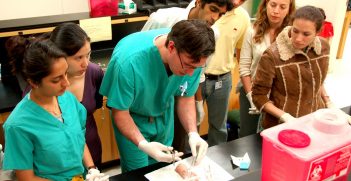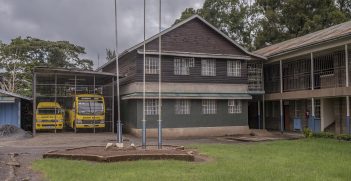The Rise of a Middle Power?

With abundant natural resources and well-established regional leadership positions, Australia seems poised to emerge from the pandemic as a thriving middle power. Its pursuit of an inquiry into the pandemics origins will be an important litmus test for Australia’s future leadership.
The outbreak and spread of COVID-19 have wreaked havoc on the global economy. Major actors, such as the US, China, UK, and Japan have been disproportionately affected by the virus due to a failure to mobilise measures to stop the spread of the virus, poor governance decisions, or just plain bad luck. No country will escape this crisis unscathed.
The outbreak of COVID-19 may however precipitate the structural power shift necessary to make middle powers more important stakeholders in global decision making. Middle powers are actors who employ a moderate to large influence on international politics and receive international recognition. Alliance relationships and structures have previously limited the options available to middle powers in exercising their influence, but there is nothing currently preventing Australia from leveraging these frameworks to its advantage.
The global pandemic has illustrated Australia’s vulnerability to consolidated supply chains and a reliance on a single major trading partner. Australia now has both the permissive structural conditions and the resources to engage in successful middle power diplomacy, provided that it can muster the willingness to exercise political and diplomatic agency. To do so, Australia should lean on its powerful connections in the Five Eyes Network and further deepen trade and cultural connectivity throughout the Indo-Pacific.
Leading the charge
Australia has exhibited significant policy leadership during the COVID-19 crisis. Government action to control and contain the spread of COVID-19 and the decision implement lockdown measures were rapid, front-footed, and ahead of global trends and World Health Organization advice. Additionally, Australia is resource-wealthy and possesses a healthy agricultural sector, despite ongoing drought. It has the potential to increase this self-sustaining propensity with a small-scale return to manufacturing. It has a $200 billion defence investment program for the next decade and a largely untapped potential for renewable energy production. Compared to many major powers, this is a powerful posture.
Australian diplomacy in the Indo-Pacific region has seen several recent successes. Trade agreements with Indonesia and India, the provision of aid through the Pacific Step Up program (namely the Australian Infrastructure Financing Facility for the Pacific and the Pacific Labour Mobility Scheme), and the upcoming signing of the Regional Comprehensive Economic Partnership with China, Japan, South Korea, New Zealand, Brunei, Cambodia, Indonesia, Laos, Malaysia, Myanmar, the Philippines, Singapore, Thailand, and Vietnam. Australia is cementing its presence as a tactful, constructive, and friendly regional middle power. To continue this role in the post-COVID recovery period, Australia will have to step up when its neighbours in the Pacific region need a hand. This may require increased foreign aid spending and international supply chain support for the provision of medical equipment to states struggling to meet demand.
The US’s waning strategic posture, flailing economic position, and fumbled COVID-19 response will further encourage some states to search for alternative direction. President Donald Trump’s decision to withdraw WHO funding and sustained attack on the US’s role as leader of the liberal democratic order has created a vacuum for solid and sensible leadership.
Harnessing Australia’s nascent capabilities
Around the globe, Australia’s “lovable larrikin” stereotype attracts people to the narrative of the nation. Australia has a presence in the global political discourse and a regional voice that is growing stronger. The creation of APEC, becoming the first of ASEAN’s ten dialogue partners in 1974, extensive involvement in UN fora, and a leadership role in the Cairns Group exemplify Australia’s commitment to regionalism and ability to assert its agenda on the world stage.
With robust resource and productivity sectors, Australia has the potential to redefine its trading relationships by becoming a renewable energy powerhouse in the Asia-Pacific. Channelling the abundant renewable resource capacity that has already been recognised by the current government the ANU-Zero Carbon Energy for the Asia-Pacific Project, is an existing blueprint for a practical path towards this goal. Enhancing Australia’s position as an energy export powerhouse by accelerating production of renewable energy is an important way of increasing international status and credibility.
Road to Recognition
Australia is currently spearheading an independent review into the origins of COVID-19. Foreign Minister Marise Payne, supported by the prime minister and the cabinet, is leading an effort to investigate the genesis of the disease. At a press conference on 23 April in response to the Chinese Ambassador to Australia threatening a consumer boycott if Australia persists with demands for the inquiry, Prime Minister Scott Morrison declared that Australia should stand up for independence, transparency, and public health. The Chinese embassy has since released the details of private conversations with a top DFAT official. Minister Payne has held firm and further advocated for a future model of pandemic preparedness, allowing independent health inspectors to go into areas of potential virus outbreak. The response represents a confident, assertive Australian foreign policy which stands up for principled beliefs in spite of international scrutiny and backlash. The international community’s reaction to this posture will be a good litmus test of how credible and effective Australia’s new approach is.
Whether Australia leans into this role as a rising middle power, or stops to let the world pass it by will rely on two factors – the extent and depth of COVID-19’s economic impact into the future and Australia’s political will to harness its advantage with respect to the current dynamics between major powers. The success of Australia’s current position in the context of global politics will entirely depend on how and when Canberra decides to apply its diplomatic skillset to the world stage, and whether Australia decides to swing in behind these choices. There has never been a more compelling time for Australia to take advantage of its status as a global middle power and rise to the occasion.
Georga Nonnenmacher is a fourth year Law/IR student at the ANU with a particular interest in regional diplomacy and Australian politics. She is a policy and business analyst for a government relations firm in Canberra.
This article is published under a Creative Commons Licence and may be republished with attribution.





